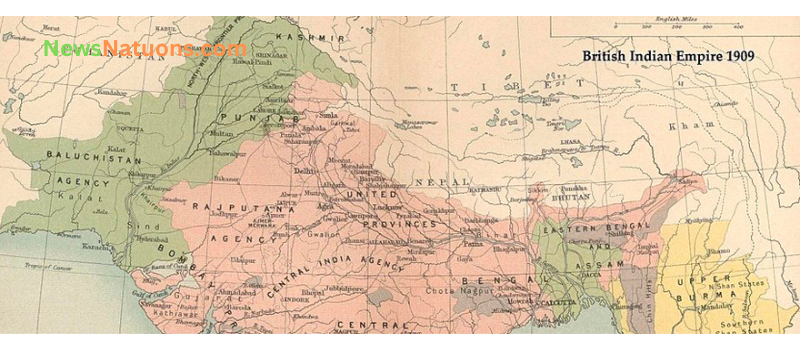Tensions between Pakistan and India have once again escalated, but this time the situation appears more complex than a traditional border standoff. Recent unrest across seven Indian states, along with speculations of Bangladesh aligning with Pakistan, has created a volatile atmosphere in South Asia. These developments could potentially shift the geopolitical balance in the region and push it toward deeper instability.
What’s Happening in Seven Indian States?
India’s northeastern region, particularly the seven states commonly known as the “Seven Sisters” — Assam, Nagaland, Manipur, Mizoram, Tripura, Arunachal Pradesh, and Meghalaya — is witnessing significant unrest. In Manipur, violent clashes between Hindu and Christian tribal groups have resulted in dozens of casualties. Other states like Nagaland and Assam are experiencing a resurgence in separatist movements and anti-government protests.
The growing ethnic and religious tensions in these states are rooted in long-standing grievances against the central government. Many communities feel marginalized and neglected, both economically and politically. Internet shutdowns, curfews, and heavy military deployment have failed to fully control the unrest, raising serious concerns about internal stability within India.
These internal conflicts have distracted India from its broader regional ambitions and weakened its position on the international stage. Analysts suggest that if these states continue to spiral into chaos, India’s ability to manage external threats, including its rivalry with Pakistan, could be severely impacted.
Is Bangladesh Aligning with Pakistan?
Adding to India’s challenges, unconfirmed reports and online discourse have suggested that Bangladesh may be reconsidering its traditional alliance with India. While the Bangladeshi government has not made any official statements confirming a shift, several political and religious groups within Bangladesh have voiced support for Pakistan’s stance on issues like Kashmir and criticized India’s domestic policies.
If Bangladesh moves closer to Pakistan, even symbolically, it would represent a significant diplomatic blow to India. Such a development could open a new front of pressure on India’s eastern border, complicating its strategic calculations.
Some observers believe that the current Indian administration’s approach to regional diplomacy and internal governance may be pushing its neighbors further away. The rise in anti-India sentiments in parts of South Asia could pave the way for new alliances that challenge India’s regional dominance.
Is a New Cold War Brewing in South Asia?
The evolving dynamics between Pakistan, India, and Bangladesh suggest that South Asia may be entering a new phase of strategic competition. With Pakistan strengthening its diplomatic influence and internal dissent weakening India’s unity, the region seems poised for a new kind of cold war. Instead of direct military confrontation, this rivalry could involve political maneuvering, propaganda, and soft power battles.
India now faces mounting pressure on multiple fronts — internal unrest, diplomatic isolation, and increased hostility from its neighbors. How New Delhi navigates these challenges will shape the region’s future for years to come.
Conclusion
The Pak-India conflict is no longer just about border disputes; it’s becoming a multifaceted struggle involving domestic instability and shifting alliances. With seven Indian states in turmoil and rumors of Bangladesh warming up to Pakistan, the regional balance is tilting. South Asia stands at a critical juncture where peace, power, and politics are colliding in unpredictable ways.
پاکستان اور بھارت کے درمیان دیرینہ کشیدگی ایک مرتبہ پھر سنگین رخ اختیار کر گئی ہے، اور اب اس میں خطے کے دیگر ممالک کے ممکنہ کردار نے نئی ہلچل پیدا کر دی ہے۔ حالیہ دنوں میں بھارت کے اندر سات ریاستوں میں جاری بے چینی، مظاہروں اور پرتشدد واقعات نے صورتحال کو مزید گھمبیر بنا دیا ہے۔ ان واقعات کے پس منظر میں بعض تجزیہ کار اسے پاک بھارت کشیدگی سے جوڑ رہے ہیں، جبکہ بعض حلقوں میں بنگلہ دیش کے ممکنہ طور پر پاکستان کے ساتھ کھڑے ہونے کی خبریں بھی زیرِ گردش ہیں، جس سے جنوبی ایشیا میں سیاسی اور اسٹریٹیجک توازن خطرے میں پڑتا نظر آ رہا ہے۔
بھارت کی سات ریاستوں میں کیا ہو رہا ہے؟
بھارت کی سات ریاستوں، جن میں آسام، ناگالینڈ، منی پور، میزورم، تریپورہ، اروناچل پردیش اور میگھالیہ شامل ہیں، میں حالیہ ہفتوں کے دوران شدید مظاہرے، حکومت مخالف تحریکیں، اور نسلی و مذہبی کشیدگی دیکھنے میں آئی ہے۔ ان علاقوں میں بنیادی طور پر نارتھ ایسٹ بھارت کے قبائلی گروہ آباد ہیں، جو خود کو مرکزی حکومت سے کٹا ہوا محسوس کرتے ہیں۔ منی پور میں ہندو اور قبائلی کرسچین کمیونٹی کے درمیان پرتشدد جھڑپیں جاری ہیں، جن میں درجنوں جانیں جا چکی ہیں۔ آسام اور ناگالینڈ میں علیحدگی پسند تحریکیں ایک بار پھر زور پکڑ رہی ہیں۔
ان ریاستوں میں امن و امان کی بگڑتی صورتحال نے بھارتی حکومت کو دفاعی اقدامات پر مجبور کر دیا ہے۔ فوج کی تعیناتی، انٹرنیٹ کی بندش، اور کرفیو جیسے اقدامات کیے گئے ہیں، مگر حالات مکمل طور پر قابو میں نہیں آئے۔ مبصرین کا ماننا ہے کہ یہ اندرونی خلفشار نہ صرف بھارت کی سیاسی طاقت کو کمزور کر رہا ہے بلکہ خطے میں اس کے اسٹریٹیجک عزائم کو بھی متاثر کر سکتا ہے۔
کیا بنگلہ دیش پاکستان کے ساتھ ہے؟

حالیہ رپورٹس میں یہ دعویٰ کیا جا رہا ہے کہ بنگلہ دیش، جو کبھی بھارت کا اتحادی سمجھا جاتا تھا، اب پاکستان کی پوزیشن کو ہمدردی کی نگاہ سے دیکھ رہا ہے۔ اگرچہ حکومتِ بنگلہ دیش نے سرکاری طور پر ایسی کسی بھی پیش رفت کی تصدیق نہیں کی، مگر بعض بنگلہ دیشی سیاسی و مذہبی جماعتوں نے بھارت کے اندرونی حالات اور کشمیر پالیسی پر تنقید کی ہے۔ سوشل میڈیا پر بھی پاکستان اور بنگلہ دیش کے درمیان بڑھتے رابطوں کے حوالے سے بات چیت جاری ہے۔
اگر بنگلہ دیش واقعی پاکستان کے ساتھ کسی سطح پر کھڑا ہوتا ہے تو یہ بھارت کے لیے ایک بڑا سفارتی اور دفاعی دھچکہ ہو سکتا ہے۔ دونوں ممالک کی جغرافیائی قربت اور مسلمانوں کی اکثریت رکھنے والا بنگلہ دیش اگر بھارت سے دور ہوتا ہے، تو بھارت کو مشرقی سرحد پر بھی دباؤ کا سامنا ہو سکتا ہے۔
خطے میں نئی سرد جنگ کے آثار؟
پاکستان، بھارت اور ممکنہ طور پر بنگلہ دیش کے درمیان بڑھتی کشیدگی جنوبی ایشیا کو ایک نئی سرد جنگ کی طرف دھکیل سکتی ہے۔ اگر بھارت اندرونی مسائل اور بیرونی دباؤ کا شکار ہو جاتا ہے، تو یہ نہ صرف اس کی معیشت بلکہ عالمی سطح پر اس کی ساکھ کو بھی متاثر کر سکتا ہے۔ پاکستان اپنی سفارتی کامیابیوں اور دفاعی تیاریوں کے ذریعے بھارت کو چیلنج کر رہا ہے، اور اگر بنگلہ دیش بھی اس محاذ پر کھڑا ہو جائے تو یہ خطے میں ایک نیا اتحاد پیدا کر سکتا ہے۔
نتیجہ
پاک بھارت تعلقات میں حالیہ کشیدگی، بھارت کی سات ریاستوں میں عدم استحکام اور بنگلہ دیش کے بدلتے رویے نے خطے میں ایک نیا بحران پیدا کر دیا ہے۔ جنوبی ایشیا کے امن و سلامتی کے لیے یہ ایک نازک وقت ہے، جہاں ہر فیصلہ اور ہر اتحاد دور رس نتائج کا حامل ہو سکتا ہے۔ اب دیکھنا یہ ہے کہ بھارت اندرونی اور بیرونی چیلنجز سے کیسے نمٹتا ہے، اور کیا یہ تنازع بات چیت کی میز پر لایا جا سکتا ہے یا ایک نئے بحران کی شکل اختیار کرے گا؟











